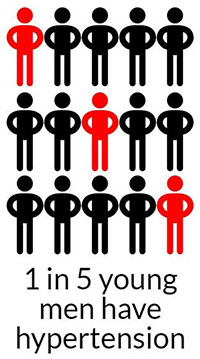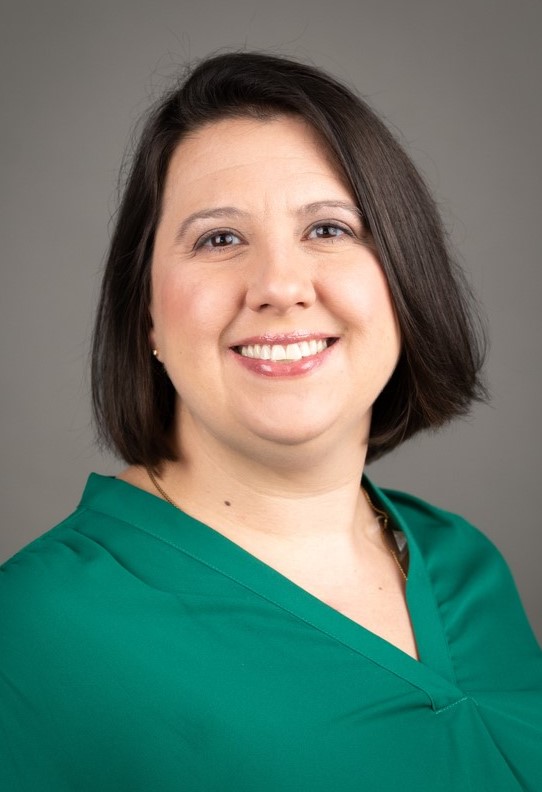*Free registration is required to use the toolkits provided within HIPxChange. This information is required by our funders and is used to determine the impact of the materials posted on the website.
Background
 Young adults have the lowest rates of blood pressure control compared to older adult age groups.
Young adults have the lowest rates of blood pressure control compared to older adult age groups.
- In the United States, over 10 million young adults (1 in 5 men; 1 in 6 women) have hypertension, increasing their risk of heart failure, stroke, and chronic kidney disease.
- Young adults with hypertension have a higher lifetime risk for cardiovascular disease due to the longer exposure to higher blood pressures and ongoing risk of organ damage.
- Hypertension control reduces morbidity, mortality, and future healthcare costs. Yet, only 35% of young adults with hypertension in the U.S. have achieved blood pressure control (defined as a blood pressure <140/90 mmHg).
- Unfortunately, many young adults have reported a lack of resources for high blood pressure information and heart health education.
To address these problems, the MyHEART (My Hypertension Education And Reaching Target) program was created at the University of Wisconsin School of Medicine & Public Health (Madison, WI). MyHEART was created with young adults and healthcare team members to address a broad range of topics.
MyHEART Vision
The ultimate goal of MyHEART is to share information with young adults to help them:
- Live a healthier life
- Lower their blood pressure
- Prevent heart disease
MyHEART focuses on increasing young adult self-management skills to promote heart healthy choices and lower blood pressure.
Why was MyHEART created?
Young adults are less likely to be diagnosed and receive medication
Dr. Heather M. Johnson has evaluated hypertension diagnosis and treatment rates for young adults compared to other adult age groups.
Her published electronic health record analysis of over 4,000 adults who were 18 years of age or older with incident (new) hypertension demonstrated that young adults were less likely to receive a hypertension diagnosis and/or blood pressure medication compared to middle-aged and older adults.
Young adults are less likely to receive lifestyle education
Additionally, Dr. Johnson’s research demonstrated that among over 500 randomly selected young adults, only 55% had documented lifestyle education within one year of developing hypertension. However, the hypertension guidelines recommend ongoing lifestyle modification counseling for everyone.
Some of the important medical provider and patient barriers to lifestyle counseling have included limited time to manage multiple co-morbidities and patient visit non-adherence (no-shows, not scheduling follow-up visits).
In summary, Dr. Johnson’s research highlighted the critical need to provide health education to young adults in a way that overcomes these barriers.
What is MyHEART?
To address the unmet need in the delivery of hypertension education for young adults, Dr. Johnson’s research team developed the MyHEART program.
MyHEART is a multi-component, theoretically-based intervention designed to increase hypertension education and self-management skills (e.g., health behavior change, blood pressure monitoring) among young adults with uncontrolled hypertension.
MyHEART targets barriers to hypertension control identified in Dr. Johnson’s research and tailors the delivery of hypertension education to preferences expressed by young adults.
What does the MyHEART toolkit contain?
The MyHEART toolkit contains two sections:
- Introduction to the MyHEART site: This section contains information on why MyHEART was created, how it was developed, who should use MyHEART, and an overview of what is on the website.
- How to use the MyHEART website in your organization: This section contains information and tools you can use to publicize and promote the use of the MyHEART website in your organization, including posters, brochures, and sample social media and website posts.
Who should use the toolkit?
This toolkit is intended for clinicians, health care administrators, or other health advocates who are seeking to use and promote the use of MyHEART within their organization.
This toolkit is not intended for patients.
Development of this toolkit
The MyHEART website was developed by young adults, researchers, and healthcare providers (Principal Investigator: Heather M. Johnson, MD, MS, FAHA) at the University of Wisconsin-Madison School of Medicine & Public Health – Department of Medicine.
This project was supported by the Clinical and Translational Science Award (CTSA) program, through the NIH National Center for Advancing Translational Sciences (NCATS), grant UL1TR000427. Additional support was provided by the University of Wisconsin School of Medicine and Public Health’s Health Innovation Program (HIP), the Wisconsin Partnership Program, and the Community-Academic Partnerships core of the University of Wisconsin Institute for Clinical and Translational Research (UW ICTR), grant 9 U54 TR000021 from the National Center for Advancing Translational Sciences (previously grant 1 UL1 RR025011 from the National Center for Research Resources). The content is solely the responsibility of the authors and does not necessarily represent the official views of the National Institutes of Health or other funders.
Acknowledgments: We would like to thank Colleen Brown and Jamie LaMantia for contributing their time and expertise to this toolkit development.
Please send questions, comments, and suggestions to HIPxChange@hip.wisc.edu.
References
- Johnson HM, LaMantia JN, Warner RC, Pandhi N, Bartels CM, Smith MA, Lauver DR. MyHEART: A Non Randomized Feasibility Study of a Young Adult Hypertension Intervention. J Hypertens Manag. 2016;2(2):016.
- Johnson HM, LaMantia JN, Brown CM, Warner RC, Zeller LM, Haggart RC, Stonewall K, Lauver DR. My Hypertension Education and Reaching Target (MyHEART): Development and Dissemination of a Patient-Centered Website for Young Adults with Hypertension. JMIR Cardio. 2017 Jul-Dec;1(2):e5.
Toolkit citation
Johnson HM, LaMantia JN. The MyHEART Website: Providing Information, Educational Materials, and Resources for Young Adults with High Blood Pressure (Hypertension). 2017; University of Wisconsin – Madison Department of Medicine and the Health Innovation Program. Available at: https://www.HIPxChange.org/MyHEART







